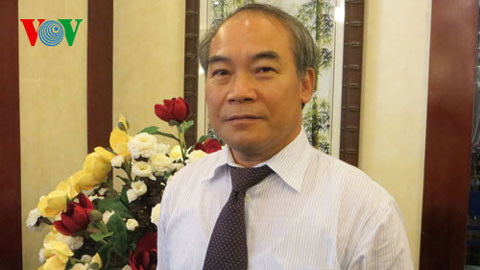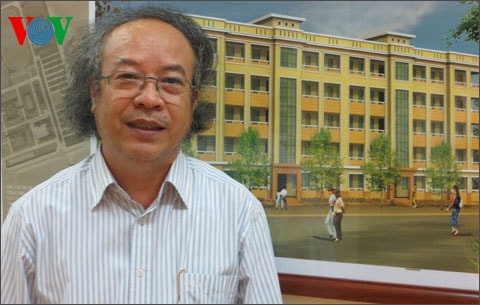"The Literature exam will change fundamentally"
The Literature exam will gradually shift to applying knowledge, skills, and developing students' comprehensive abilities.
From June 2 to 4, the 2014 High School Graduation Exam will take place. This year, candidates will take the graduation exam in 4 subjects; including 2 compulsory subjects: Math and Literature; 2 subjects that candidates can choose from among the following subjects: Physics, Chemistry, Biology, History, Geography, Foreign Language.
One of the new points of this year's high school graduation exam is that the time for the Literature test is reduced from 150 minutes to 120 minutes.
The exam may include works outside the textbook.
In response to the concerns and worries of teachers and students about the Literature exam when there was a sudden and urgent change in the exam time for this subject to 120 minutes, Deputy Minister of Education and Training Nguyen Vinh Hien said: For the Literature subject, because the exam time is reduced to 120 minutes, the exam questions will be calculated so that the exam size is appropriate to the exam time.
 |
| Deputy Minister of Education and Training Nguyen Vinh Hien: Literature exam questions will have fundamental changes. |
Up to now, teaching and learning Literature from primary to high school level has been familiar with teaching according to model essays, which works students learn are tested and evaluated. This situation leads to students only "parrot learning, memorize, and learn lopsidedly" without testing and evaluating students' thinking and creative abilities.
Deputy Minister Nguyen Vinh Hien emphasized that in the roadmap of fundamental and comprehensive innovation of education and training, the high school graduation exam will aim to test and evaluate the actual general capacity of learners, including the capacity for each subject. The innovation of Literature subject is also part of that general trend.
This year's Literature exam will consist of two parts: Reading and Writing. Reading is a compulsory test and has been implemented from primary to secondary school. Teaching Reading takes up a large proportion of time and content structure.
The Reading Comprehension test in this year's high school graduation exam may be in the form of a text excerpt (may or may not be in the textbook) requiring students to answer questions demonstrating their Reading Comprehension skills.
The writing section, which may include two parts for candidates to choose from, is a social essay or a literary essay, or it may be a comprehensive test requiring both social and literary essays. These are two familiar writing genres that have been present for many years in the Literature exam in high school graduation exams.
The Literature exam requires students to acquire the ability and skills to perceive and analyze. This does not mean that students will take the exam on any work they learn, but through the learning process, students will acquire the ability to read, understand, and perceive literature, not to test how much they can remember of that work.
In the Literature exam, the Ministry of Education and Training does not provide the concept of exam structure but only follows the exam matrix. The exam matrix will require candidates to apply more knowledge.
According to Deputy Minister Nguyen Vinh Hien, the 120-minute Literature exam is also based on a survey of the teaching situation at high school level in localities to serve as a basis for breakthroughs in testing and evaluating the teaching and learning capacity of teachers and students. This testing and evaluation is aimed at the goal of better teaching and learning.
In the upcoming high school graduation exams, not only Literature but also other subjects, when changing the time, must still ensure the requirements for testing and evaluating teaching and learning capacity better.
Deputy Minister Nguyen Vinh Hien affirmed that the Literature exam will have a fundamental change, shifting from requiring students to memorize the content they have read and understood from works in textbooks to applying knowledge and reading comprehension skills that have been formed, practiced, and developed students' comprehensive capacity.
Students' knowledge and skills are applied to reading and understanding other works that are not in textbooks but have the same content structure and difficulty level as the works they have studied. This type of test can also be applied to candidates taking the C and D blocks in the university and college entrance exams. This test method will evaluate students' reading comprehension ability more objectively and accurately; avoiding the phenomenon of "learning by rote".
Test questions according to the requirements of comprehensive development of students' abilities
Associate Professor, Doctor (PTS.TS) Do Ngoc Thong, Deputy Director of the Department of Secondary Education (Ministry of Education and Training) proposed to innovate the Literature exam in the direction of comprehensive testing, initially applying the assessment method based on students' abilities. From there, it will help candidates gradually approach the requirements when implementing the new program and textbooks; organize a national exam, take a comprehensive exam to both consider high school graduation and consider university admission.
According to the proposed plan, the total score will be calculated on a 20-point scale including: Reading comprehension (6/20) and Writing ability (14/20).
 |
| Dr. Do Ngoc Thong: Literature exam questions should meet the requirements of developing students' comprehensive abilities. |
Reading Comprehension:The test will test knowledge of Vietnamese by requiring students to detect errors in spelling, grammar, punctuation, word usage, logic, etc. in a passage with many errors and require students to detect those errors (2 points); Require students to summarize the main idea of a given passage, which can be Literature, History, Geography, Natural Science, etc. (2 points); Point out unique artistic devices and their effects in a given poem/literature (2 points).
Thus, instead of testing the memorization and recall of theoretical knowledge such as: What is rhetoric? What is a correct sentence? What is a summary of a text?... The test will focus on students' reading comprehension ability through applying their knowledge of Vietnamese to solve questions.
In the long term, it is possible to increase the number of Reading and multiple-choice test scores such as the Program for International Student Assessment (PISA) or the California State High School Graduation Exam (USA).
The Writing Proficiency Test includes:Writing a social essay (7/20 points), requires synthesizing knowledge of Literature, History, Geography, Ethics... in the form of open questions and open answers.
Writing a Literary Essay (7/20 points), requiring high differentiation towards university admission. The question requires creative application of understanding of literary knowledge and skills to practice, analyze, evaluate, comment, and refute a literary issue, a text, or an excerpt that has not been studied in textbooks.
Similar to the Reading Comprehension test, in the long run the Writing test may integrate both social and literary argumentation into a comprehensive essay like the California State Writing Test (USA).
With the above exam, the graduation score will be calculated for students who score 10/20 or higher. Universities, especially those with social and humanistic orientations, base their admissions on the total score of 3 questions and the score of question 3.
According to the explanation of Associate Professor Dr. Do Ngoc Thong, with the above essay topic, students do not need to copy the topic or the essay but answer directly to each question. The exam is open-ended so students can completely determine the specific content according to their own understanding. With the above way of setting the questions, students who bring in documents cannot do anything. The exam supervisor does not need to waste time examining or confiscating the students' documents.
The above method of setting up the Literature exam not only tests the candidates' knowledge of this subject but also the knowledge of other subjects such as History, Geography, Civic Education... are also mobilized and applied to the writing. This method of setting up the exam will test and innovate the assessment in the direction of developing the students' comprehensive qualities and abilities./.
According toVOV.VN






